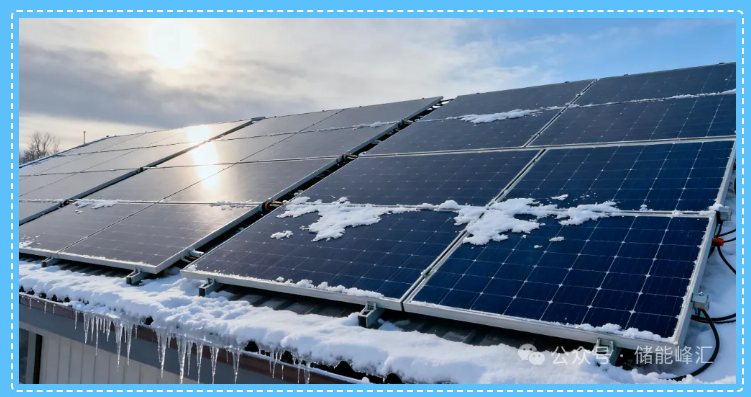
Will the power generation of solar panels decrease when the weather is cold?

Every winter, many users wonder, “Are my solar panels sensitive to the cold? Why do they seem to be generating less electricity?” The answer is quite the opposite. Low temperatures themselves don’t slow down a panel’s efficiency; instead, they can actually improve performance. What really causes fluctuations in winter power generation are the environmental factors associated with cold weather. Understanding this is crucial for ensuring stable winter performance.
The core of a solar panel’s power generation is the photovoltaic cell, whose conversion efficiency has a clear inverse relationship with temperature. Commonly used commercial photovoltaic modules (such as the familiar crystalline silicon modules) operate optimally at approximately 25°C. Once the ambient temperature drops below this value, the module temperature decreases, reducing energy losses during electron conversion within the photovoltaic cell and slightly improving power generation efficiency. For example, on a clear winter afternoon, if the temperature remains between 0 and 10°C and there is no obstruction, the actual power generation efficiency of a solar panel can be 5%-10% higher than on a sunny summer day above 30°C. In other words, as long as the sunlight is adequate, cold weather can actually allow solar panels to perform exceptionally well.
However, there is indeed a decline in power generation in winter, but the root cause of the problem is not the low temperature, but the unique environmental limitations of winter. First, the sunshine time has become shorter. Compared with summer, the length of daylight in winter will be reduced by 30%-50%. For example, in some places in the north, the daylight is only 6-8 hours in winter. The solar panels cannot be exposed to the sun for long enough, and the total power generation per day will naturally be affected. Secondly, the light intensity has become weaker. In winter, the sun is low and the sunlight shines down obliquely. The amount of light energy that can be received by the solar panels per unit area will be reduced. In addition, there are more fog and cloudy days in winter, and the light quality will be further reduced. The most direct trouble is snow cover – as long as snow piles on the surface of the solar panel, even if it is thin snow, it will completely block the light, so that the photovoltaic cells “cannot receive the signal”. At this time, the power generation will drop significantly or even return to zero. This situation has nothing to do with temperature. It is purely a “power generation interruption” caused by physical obstruction.
The key to maintaining solar panel efficiency in cold weather is to address these issues specifically. Snow removal requires careful attention. It’s recommended to gently sweep with a soft-bristled brush or a special plastic scraper. Never scrape the panel surface with hard objects (such as a shovel), as this can damage the translucent coating and affect power generation. If installation conditions permit, adjust the panel tilt based on the local winter solar altitude, typically increasing it by 10°-15° compared to the summer angle (for example, Beijing recommends a 35°-40° tilt in winter, while Guangzhou recommends 25°-30°). This will reduce snow accumulation and allow the panels to receive more sunlight. Regular inspection of the panel wiring is also crucial. Low temperatures can cause the waterproofing strips on the wiring connectors to harden and crack, or loosen the wiring. Promptly reinforcing or replacing damaged components can prevent power loss due to poor contact.
In short, cold weather is not the enemy of solar panels; the increased efficiency they bring is actually worth taking advantage of. As long as we understand the key issues that affect power generation in winter and do a good job of snow removal, lighting optimization and line maintenance, solar panels can generate stable power even in the cold winter, saving a lot of effort on energy supply for homes or small sites.
Want to get more information about solar ? Pls follow BUYIT or contact What’s app: 008613808405352